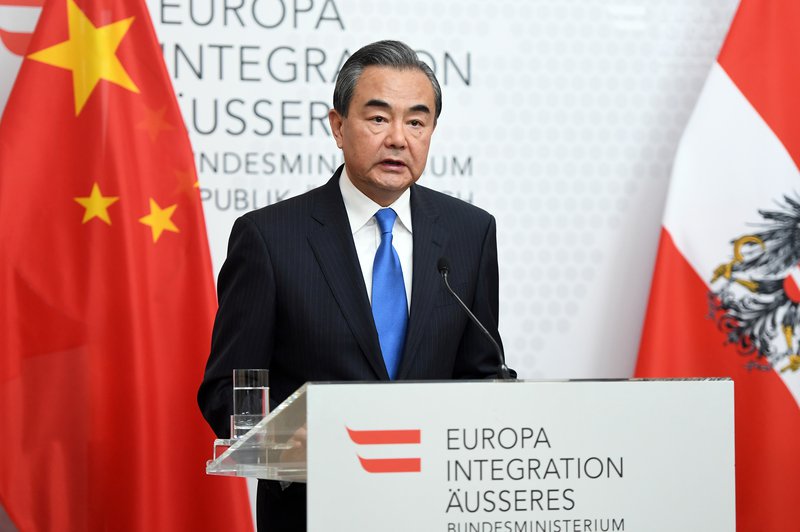
Chinese Foreign Minister Wang Yi on Sept. 8 announced an international “Global Data Security Initiative” backed by the Chinese government. The official state media story reporting his remarks is translated in full below.
The announcement marks renewed enthusiasm and an updated approach for Chinese public diplomacy on international internet governance, digital economy rule-making, and the now-entrenched field of data governance. It incorporates principles reminiscent of the government’s earlier emphasis on “cyber sovereignty,” while emphasizing domestic and international challenges in data security and governance.
Wang’s announcement also targets U.S. positions and actions over the last decade, rather clearly—if not explicitly—calling out spying of the types revealed by Edward Snowden, claims of cross-border jurisdictional reach such as that embodied by the CLOUD Act, and “politicizing data security issues or applying double standards,” as the Chinese government would claim the Trump administration has done.
Finally, the announcement frames the Chinese initiative as open to input from other governments, international organizations, or multi-stakeholder groups, and ready to incorporate compatible bilateral or regional efforts. Read the full announcement in translation below. –Ed.
[Edited March 31, 2022, to update link to Chinese-language original, to correct translation of 规则 in paragraph 3 from "principles" to "rules," and to include Chinese text.]
TRANSLATION
On the morning of Sept. 8, 2020, State Councilor and Foreign Minister Wang Yi proposed a “Global Data Security Initiative” during a speech entitled “Adhering to Multilateralism, Advocating Equity and Justice, and Joining Hands for Win-Win Cooperation” at the high-level session of an international seminar called “Seize the Data Opportunity, Collaborate for Development.”
Wang Yi said, right now we stand at a historic moment as new scientific and technological revolutions and industrial transformations gain momentum. Every country faces the collective responsibility of advancing the integrated development of data and the real economy, accelerating transformations in old and new development, and creating new industries and kinds of industry. Global data is becoming an impetus for every country’s economic development and industrial renewal. At the same time, data security threats pose new challenges to global digital governance. Every country urgently needs to strengthen communication, establish mutual trust, closely coordinate, deepen cooperation, collectively discuss policies to combat data security threats, and collaborate on the road to global data governance.
Wang Yi said, to effectively face the challenge of data security threats, three principles should be followed: First, adhere to multilateralism. We should persist in collective discussion, collective building, and collective benefit. On the basis of widespread participation from all sides, we should reach global data security rules that reflect every country’s wishes and respect the interests of all sides. Second, undertake both security and development. Every country has the right to protect their country’s data security according to law, and all should provide all enterprises with an open, equitable, and non-discriminatory business environment. Digital protectionism violates the objective laws of economic development, and goes against the tides of the globalization era, not only harming the rights of global consumers to access digital services, but in the end potentially impeding one’s own development. Third, hold fast to equity and justice. Data security should be upheld on the basis of facts, and laws and regulations. Politicizing data security issues and applying double standards, even to the point of freely starting rumors to blacken others’ names, violates basic principles of international relations and seriously disturbs and hinders global digital cooperation and development.
Wang Yi emphasized, China’s digital economy is developing vigorously, with the number of netizens surpassing 900 million. Chinese law includes clear provisions on safeguarding the lawful rights and interests of citizens and organizations, including data security and personal information, etc. The Chinese government strictly follows data security protection principles, and has not and will not require Chinese companies to violate the laws of other countries to provide foreign data to the Chinese government.
Wang Yi said, in order to cope with new issues and challenges and jointly build a peaceful, secure, open, cooperative, and orderly cyberspace, China wishes to launch the “Global Data Security Initiative” and welcomes active support from all parties. The main content of the initiative includes: First, treat data security objectively and rationally, and work to maintain open, secure, and stable global supply chains. Second, oppose the use of information technology to damage other countries’ critical infrastructure or steal important data. Third, take measures to prevent and end personal information harms, and not abuse information technology to conduct large-scale surveillance of other countries or illegally collect personal information of citizens of other countries. Fourth, require companies to respect local laws and do not force domestic companies to store data generated or collected overseas in their own country. Fifth, respect the sovereignty, jurisdiction, and data management rights of other countries, and do not directly access data located in other countries from companies or individuals. Sixth, needs for cross-border data retrieval by law enforcement should be addressed through judicial assistance and other channels. Seventh, information technology product and service providers should not set up backdoors in their products or services to illegally obtain user data. Eighth, information technology companies must not use users’ dependence on their products to seek illegitimate gains.
Wang Yi said he hoped China’s initiative can provide a blueprint for the formulation of international principles on data security, opening a global process; looked forward to government, international organization, and multi-stakeholder participation; and welcomed countries to support the relevant commitments of the initiative in bilateral or regional agreements, etc.
The seminar was held by the China Internet Governance Forum. Former Prime Minister [Shaukat] Aziz of Pakistan, former Prime Minister [Djoomart] Otorbaev of Kyrgyzstan, and Deputy Secretary General of the United Nations Liu Zhenmin gave speeches at the high-level session of the seminar. Chinese and foreign experts, scholars, and representatives of internet companies participated.
ORIGINAL TEXT
2020年9月8日上午,国务委员兼外长王毅在“抓住数字机遇,共谋合作发展”国际研讨会高级别会议上发表题为《坚守多边主义 倡导公平正义 携手合作共赢》的主旨讲话,提出《全球数据安全倡议》。
王毅表示,当前正处在新一轮科技革命和产业变革蓄势待发的历史时刻。各国面临促进数字和实体经济融合发展、加速新旧发展动能转换、打造新产业和新业态的共同任务。全球数据正在成为各国经济发展和产业革新的动力源泉。与此同时,数据安全风险对全球数字治理构成新的挑战。各国亟需加强沟通、建立互信,密切协调,深化合作,共商应对数据安全风险之策,共谋全球数字治理之道。
王毅表示,有效应对数据安全风险挑战,应遵循三原则:一是秉持多边主义。应坚持共商、共建、共享,在各方普遍参与基础上,达成反映各国意愿、尊重各方利益的全球数据安全规则。二是兼顾安全发展。各国都有权依法保护本国的数据安全,也都应为所有企业提供开放、公正、非歧视的营商环境。数字保护主义违背经济发展的客观规律,不符合全球化的时代潮流,不但有损全球消费者公平获得数字服务的权利,最终也会阻碍自身的发展。三是坚守公平正义。维护数据安全应以事实和法规为依据。把数据安全问题政治化,刻意搞双重标准,甚至不惜造谣抹黑,违背国际关系基本准则,也严重干扰和阻碍全球数字合作与发展。
王毅强调,中国数字经济蓬勃发展,网民数量超过9亿。中国法律对于保障公民和组织的合法权益,包括数据安全和个人信息等,都做出了明确规定。中国政府严格践行数据安全保护有关原则,没有也不会要求中方企业违反别国法律向中国政府提供境外数据。
王毅表示,为应对新问题新挑战,共同构建和平、安全、开放、合作、有序的网络空间,中国愿发起《全球数据安全倡议》,欢迎各方积极支持。倡议主要内容包括:一是客观理性看待数据安全,致力于维护全球供应链开放、安全和稳定。二是反对利用信息技术破坏他国关键基础设施或窃取重要数据。三是采取措施防范和制止侵害个人信息的行为,不得滥用信息技术对他国进行大规模监控,或非法采集他国公民个人信息。四是要求企业尊重当地法律,不得强制要求本国企业将境外产生、获取的数据存储在本国境内。五是尊重他国主权、司法管辖权和对数据的管理权,不得直接向企业或个人调取位于他国的数据。六是应通过司法协助等渠道解决执法跨境数据调取需求。七是信息技术产品和服务供应企业不应在产品和服务中设置后门,非法获取用户数据。八是信息技术企业不得利用用户对产品依赖,谋取不正当利益。
王毅表示,希望中方发起的倡议能够为制定数字安全国际规则提供一个蓝本,开启一个全球进程。期待各国政府、国际组织及多利益攸关方共同参与,欢迎各国通过双边或地区协议等形式支持倡议中的有关承诺。中方愿本着开放态度,听取各方就倡议提出有益建议。
研讨会由中国互联网治理论坛举办,巴基斯坦前总理阿齐兹、吉尔吉斯斯坦前总理奥托尔巴耶夫、联合国副秘书长刘振民在研讨会高级别会议上致辞,中外专家学者、互联网企业代表参加。
